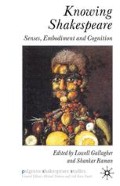Abstract
There is no such thing as “the sense of touch”; there are only senses of touch. As philosopher Mark Paterson argues, touch must involve much more than tactility or the receptivity of skin surfaces to pain, pressure, and temperature: it must also embrace proprioceptive matters such as one’s awareness of balance and of bodily movements through space (2007: 3–5). Touch in this more capacious register may be described as “haptic,” a word defined through its Greek etymology as meaning “able to come into contact with” (Bruno 2002: 6). To engage notions of the early modern haptic may appear anachronistic, for the word entered the English language only in the late nineteenth century as part of a specialized psychological and linguistic lexicon — the wider currency it has recently achieved in aesthetics, film theory, and architecture has to do with the modern science of haptics, which focuses on simulating touch and touch-based interfaces in virtual worlds. It is nevertheless true that early modern culture, no less than our own, recognized the entanglement of tactile and proprioceptive knowledge.
Access this chapter
Tax calculation will be finalised at checkout
Purchases are for personal use only
Preview
Unable to display preview. Download preview PDF.
Notes
On this point, see Jacobus: “Without breathing, one would not acquire the sensation of inhabiting the dimensionality of either space or time. For Anzieu, breath structures the third dimension, orienting the body and giving it a sense of volume, along with a psychical ‘sound-space’ within which there are rumblings, echoes, and resonances” (2005: 132).
Editor information
Editors and Affiliations
Copyright information
© 2010 Patricia Cahill
About this chapter
Cite this chapter
Cahill, P. (2010). Falling into Extremity. In: Gallagher, L., Raman, S. (eds) Knowing Shakespeare. Palgrave Shakespeare Studies. Palgrave Macmillan, London. https://doi.org/10.1057/9780230299092_5
Download citation
DOI: https://doi.org/10.1057/9780230299092_5
Publisher Name: Palgrave Macmillan, London
Print ISBN: 978-1-349-32493-4
Online ISBN: 978-0-230-29909-2
eBook Packages: Palgrave Literature CollectionLiterature, Cultural and Media Studies (R0)

